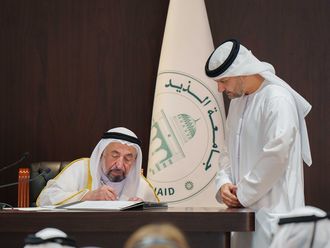Dubai: Dubai's tertiary education model is a successful example of how transnational global higher education works, said Dr Abdullah Al Karam, Director General of Dubai's Knowledge and Human Development Authority (KHDA).
He spoke at the first QS Middle East and Africa Professional Leaders in Education Conference (QS-MAPLE) on Sunday. Dr Al Karam said although transnational education is the youngest of international tertiary models it is in effect the strongest.
"Dubai serves as a mutual place for students, faculty and universities from different countries, some of them surprisingly from the same country, to come for education opportunities," he said. "What differentiates Dubai from other countries, hosting branch campuses, is that almost 90 per cent of students in these institutions are not from the UAE."
Transnational education is traditionally known as the delivery of education in a location different from the awarding institution's base. Dr Al Karam used Dubai's five free-zone education clusters as an example of the successful growth of a unique form of global transnational education different from the branch campus concept.
Not as vulnerable
"The transnational higher education model may be the youngest but I see it as the fastest growing and least vulnerable to external factors," said Dr Al Karam.
He drew comparisons to traditional international higher education models, where students travel to campuses predominantly in the West, for a quality university education; a model, very much affected by global affairs.
"Although this model will continue to exist… it is a one system model where foreign students go to a particular destination," he said. "However, the travel of students can definitely be affected by what happens politically, legislatively and financially in that country."
He used the example of declining numbers of international students traveling to the US after 11 September 2011.
Referring to the evolution of the branch campus system he said: "Branch campuses are a continually growing system in places with the economic scale such as China and India as governments will invest for their local populations,"
However, it is still a system more vulnerable than Dubai's transnational model as it solely depends on the policies of the host country.
Dubai's transnational education challenges
Dr Al Karam said Dubai's transnational higher education evolved from student demand due to a transnational secondary education system, catering to 220,000 students and 13 different curricula.
"Such a schooling system has enabled the transnational university system to grow here so quickly," he said. "This is because students attending Indian schools with a specific curriculum will most likely want to attend Indian universities or the same curriculum."
However, Dr Al Karam believes Dubai's transnational global education system is not immune to challenges, mainly quality assurance and research and development (RND).
"RND has not been significantly touched in Dubai as it's usually attached to a country's agenda and sponsorship from government entities," he said. "Here, neither the campuses nor the students are from the host country."
Due to this fact neither party has an interest in investing in the emirate's RND.
"Yet there are still many RND opportunities, not necessarily found in classical government funding methods," added Al Karam.
A significant opportunity, he believes, lies in private sector, which has already significantly contributed to the growth of Dubai's transnational schooling system.












